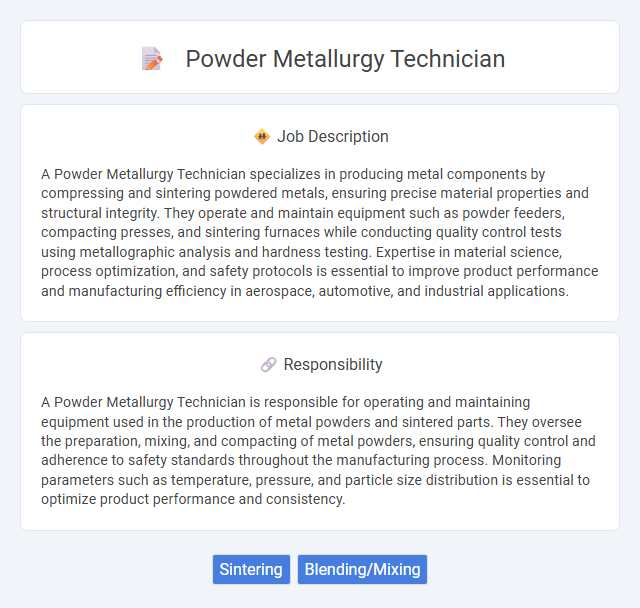
A Powder Metallurgy Technician specializes in producing metal components by compressing and sintering powdered metals, ensuring precise material properties and structural integrity. They operate and maintain equipment such as powder feeders, compacting presses, and sintering furnaces while conducting quality control tests using metallographic analysis and hardness testing. Expertise in material science, process optimization, and safety protocols is essential to improve product performance and manufacturing efficiency in aerospace, automotive, and industrial applications.
Individuals with strong attention to detail and an aptitude for handling specialized machinery may likely excel as powder metallurgy technicians. Those comfortable working in controlled laboratory or manufacturing environments with precision tasks tend to find this role more suitable. Candidates preferring routine, hands-on technical work rather than extensive physical labor might have a higher probability of job satisfaction in this field.
Qualification
A Powder Metallurgy Technician requires a strong foundation in materials science and engineering, typically holding an associate degree or technical diploma in metal fabrication or manufacturing technology. Proficiency in operating and maintaining powder metallurgy equipment, coupled with knowledge of quality control processes and safety standards, is essential. Skills in interpreting technical drawings, conducting tests on metal powders, and understanding sintering processes enhance job performance and career advancement.
Responsibility
A Powder Metallurgy Technician is responsible for operating and maintaining equipment used in the production of metal powders and sintered parts. They oversee the preparation, mixing, and compacting of metal powders, ensuring quality control and adherence to safety standards throughout the manufacturing process. Monitoring parameters such as temperature, pressure, and particle size distribution is essential to optimize product performance and consistency.
Benefit
A Powder Metallurgy Technician likely experiences benefits such as hands-on expertise in advanced manufacturing processes and the opportunity to work with innovative materials like metal powders and alloys. These roles probably offer career growth potential in industries like automotive and aerospace, where lightweight, high-strength components are in demand. The job also may provide a stable income with benefits tied to technical skill development and exposure to cutting-edge technology.
Challenge
A Powder Metallurgy Technician likely faces challenges in maintaining precise control over material composition and processing parameters to achieve consistent product quality. Troubleshooting equipment malfunctions and adapting to evolving metallurgical technologies may require ongoing problem-solving skills. Ensuring safety compliance and minimizing material waste are probable daily concerns within this role.
Career Advancement
A Powder Metallurgy Technician develops expertise in producing metal powders and fabricating components through advanced manufacturing processes. Career advancement opportunities include roles such as Process Engineer, Quality Control Specialist, and Production Supervisor, often requiring additional certifications and technical training. Mastery of materials science and proficiency in computer-aided design (CAD) and manufacturing (CAM) technologies significantly enhance promotion prospects in this field.
Key Terms
Sintering
A Powder Metallurgy Technician specializes in the sintering process, where powdered metals are heated below their melting point to bond particles and form solid components. Mastery of temperature control, atmosphere regulation, and timing is crucial to ensure optimal mechanical properties and dimensional accuracy in sintered parts. Expertise in monitoring sintering furnaces and analyzing microstructures boosts product quality and manufacturing efficiency.
Blending/Mixing
A Powder Metallurgy Technician specializing in blending and mixing ensures precise formulation of metal powders to achieve consistent material properties and optimal performance in final products. Mastery of mixing ratios, particle size distribution, and homogeneity directly impacts the density, strength, and microstructure of sintered components. Proficient use of automated blending equipment and strict adherence to quality control standards are essential for maintaining product reliability and reducing defects in powder metallurgy manufacturing.
 kuljobs.com
kuljobs.com